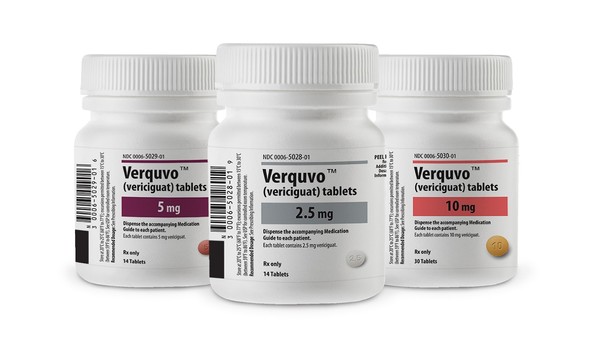Bayer Korea said Thursday that Verquvo, its chronic heart failure treatment, obtained product approval from the Ministry of Food and Drug Safety on Nov. 30.

Hospitals can use the treatment along with other heart failure medications on chronic heart failure patients who recently received intravenous diuretics and show left ventricular ejection rates of lower than 45 percent to reduce their risk of cardiovascular death and hospitalization.
The ministry based its approval on a randomized, parallel-group, placebo-controlled, double-blind, event-driven, multicenter phase 3 VICTORIA clinical trial of 5,050 patients with New York Heart Association-defined class II, III, or IV chronic heart failure at 600 medical centers in 42 countries.
Patients received up to a target maintenance dose of either placebo or Verquvo 10 mg combined with other heart failure therapies.
Heart failure is a condition in which oxygen cannot be delivered to peripheral organs due to structural or functional abnormalities of the heart. The illness is the main cause of hospitalization for patients over the age of 65. The prevalence of heart failure in Korea has steadily increased over the past 10 years due to an aging population.
Heart failure also has a high risk of worsening over time, and the survival rate is low as about 50 percent of patients diagnosed with heart failure die within five years.
While current therapies block the harmful effects of the natural neurohormonal systems activated by the myocardial and vascular dysfunction present in heart failure, Verquvo works in conjunction with existing approaches through a different mode of action.
It specifically restores the deficient nitric oxide (NO), soluble guanylyl cyclase (sGC), and cyclic guanosine monophosphate (cGMP) signaling cascade pathway, which plays a critical role in the progression of heart failure and aggravating its symptoms.
As a result of the clinical study, Verquvo met the primary endpoint after showing an approximately 10 percent lower risk of cardiovascular death or first hospitalization for heart failure over an average follow-up period of 10.8 months and an annual absolute risk reduction of 4.2 percent, compared to the placebo group.
The most common adverse reactions in the study were hypotension and anemia and showed a profile similar to that of the placebo group.
“Heart failure is one of the diseases with a very high risk of death or hospitalization burden due to repeated exacerbation and hospitalization,” Bayer Korea Medical Director Jung Hyung-jin said. “Verquvo has demonstrated consistent efficacy in reducing the risk of cardiovascular death and hospitalization for heart failure in severely high-risk patients.”
Jung added that Bayer Korea is pleased to offer a treatment option to reduce cardiovascular mortality and hospitalization in patients with high-risk chronic heart failure.

